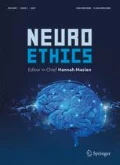Abstract
Recent Libet-style experiments are of limited relevance to the debate about free action and free will, and should be understood as investigations of arbitrary actions or guesses. In Libet-style experiments, the concept of 'free action' is commonly taken to refer to a 'self-initiated voluntary act', where the self prompts an action without being prompted. However, this idea is based on the problematic assumption that the conscious self needs to be free from every constraint in order to be actually free. We maintain that a fundamental condition for free action is the presence of reasons to act responsibly. By analyzing a recent neuroscientific experiment, we indicate how its results could be interpreted as indicating how free action operationalization is inappropriately focusing on arbitrary actions. Hence, the way free action has been experimentally studied may have had a misleading influence on the debate about free will.
Similar content being viewed by others
Notes
Although the concept of “cue” is used often, its relationship with the concept of “cause” and “reason” is not completely clear. To our understanding, in the current context “cue” has an epistemic connotation, a cue provides information that is used (e.g. taken as a reason) for potential action.
We do not wish to imply that the authors agree on all issues, rather to illustrate the various ways of emphasizing the relation between free will, free action and responsibility.
There is one potential confusion we would like to forestall here. One could still meaningfully attribute responsibility in this case in the following way: If one believes that X and therefore one does Y, that could be wrong (blameworthy) in the sense that never in the case of X one should do Y, regardless of whether or not X is actually the case. This, however, is a type of responsibility (what would you do if X applies) that we are not discussing here. We are addressing responsibility for action, not for hypothetical action.
In Bode’s experiment, this freedom is represented by subjects' liberty not to comply with experimenters' requests.
References
Libet, Benjamin, Elwood W. Wright, and Curtis A. Gleason. 1982. Readiness-potentials preceding unrestricted “spontaneous” vs. pre-planned voluntary acts. Electroencephalography and Clinical Neurophysiology 54: 322–335.
Soon, Chun Siong, Marcel Brass, Hans-Jochen Heinze, and John-Dylan Haynes. 2008. Unconscious determinants of free decisions in the human brain. Nature Neuroscience 11: 543–545. doi:10.1038/nn.2112.
Fried Itzhak, Roy Mukamel, and Gabriel Kreiman. 2011. Internally generated preactivation of single neurons in human medial frontal cortex predicts volition. Neuron 69: 548–562. doi:10.1016/j.neuron.2010.11.045.
Pockett, Susan, and Suzanne C. Purdy. 2010. Are voluntary movements initiated preconsciously? The relationships between readiness potentials, urges, and decisions. In Conscious Will and Responsibility, eds. Walter Sinnot-Armstrong, Lynn Nadel, 34–46. New York: Oxford University Press, Inc. doi:10.1093/acprof:oso/9780195381641.003.0005.
Schlegel, Alexander, Prescott Alexander, Walter Sinnott-Armstrong, Adina Roskies, Peter U. Tse, and Thalia Wheatley. 2013. Barking up the wrong free: readiness potentials reflect processes independent of conscious will. Experimental Brain Research 5(3-4): 193–208. doi:10.1080/17588928.2014.934215.
Nachev, Parashkev, and Peter Hacker. 2014. The neural antecedents to voluntary action: a conceptual analysis. Cognitive Neuroscience 5(3–4): 193–208. doi:10.1080/17588928.2014.934215.
Nachev, Parashkev, and Masud Husain. 2010. Action and the fallacy of the “internal”: Comment on Passingham et al. Trends in Cognitive Sciences 14: 192–193. doi:10.1016/j.tics.2010.03.002.
Roskies Adina L. 2010. How does neuroscience affect our conception of volition?. Annual Review of Neuroscience 33: 109–130. doi:10.1146/annurev-neuro-060909-153151.
Passingham, Richard E., Sara L. Bengtsson, and Hakwan C. Lau. 2010. Medial frontal cortex: from self-generated action to reflection on one’s own performance. Trends in Cognitive Sciences 14: 16–21. doi:10.1016/j.tics.2009.11.001.
Schüür, Friederike, and Patrick Haggard. 2011. What are self-generated actions?. Consciousness and Cognition 20: 1697–1704. doi:10.1016/j.concog.2011.09.006.
Nachev, Parashkev. 2010. Free choice and voluntary action. Psyche 16: 87–98. http://philpapers.org/rec/NACFC.
Passingham, Richard E, Sara L Bengtsson, and Hakwan C Lau. 2010. Is it fallacious to talk of selfgenerated action?: Response to Nachev and Husain. Trends in Cognitive Sciences 14: 193–194. doi:10.1016/j.tics.2010.03.004.
Passingham, Richard E, and Hakwan C Lau. 2006. Free Choice and the Human Brain. In Does Consciousness Cause Behavior?, eds. Susan Pockett, William Banks, and Shaun Gallagher, 52–72. Cambridge-London: The MIT Press. doi:10.7551/mitpress/9780262162371.003.0005.
Bode, Stefan, Carsten Bogler, and John-Dylan Haynes. 2013. Similar neural mechanisms for perceptual guesses and free decisions. NeuroImage 65 Elsevier Inc.: 456–465. doi:10.1016/j.neuroimage.2012.09.064.
Wolf, Susan. 1990. Freedom within reason. New York: Oxford University Press.
Mita, Akihisa, Hajime Mushiake, Keisetsu Shima, Yoshiya Matsuzaka, and Jun Tanji. 2009. Interval time coding by neurons in the presupplementary and supplementary motor areas. Nature Neuroscience 12: 502–507. doi:10.1038/nn.2272.
Strawson, Galen. 2010. Freedom and belief. New York: Oxford University Press. doi:10.1093/acprof:oso/9780199247493.001.0001.
Strawson Peter. 1963. Freedom and resentment. Proceeding of the British Academy 48: 1–25
Dennett, Daniel C. 1984. Elbow room: The varieties of free will worth wanting. Oxford: Clarendon Press.
Frankfurt, Henry G. 1988. Freedom of the will and the concept of a person. The Journal of Philosophy 68: 5–20.
Fischer, Martin J., and Mark Ravizza. 2000. Responsibility and Control: A Theory of Moral Responsibility. Cambridge studies in philosophy and law. Cambridge, New York: Cambridge University Press.
McKenna, Michael. 2009. Compatibilism. The Stanford Encyclopedia of Philosophy. http://plato.stanford.edu/entries/compatibilism. Accessed 14 October 2015.
O’Connor, Timothy. 2013. Free will. The Stanford Encyclopedia of Philosophy. http://plato.stanford.edu/entries/freewill. Accessed 14 October 2015.
Roskies, Adina L. 2010. Why Libet’s studies don’t pose a threat to free will. In Conscious will and responsibility, eds. Walter Sinnot-Armstrong, Lynn Nadel, 11–22. New York: Oxford University Press, Inc. doi:10.1093/acprof:oso/9780195381641.003.0003.
Bode, Stefan, Carsten Murawski, Chun Siong Soon, Philipp Bode, Jutta Stahl, and Philip L. Smith. 2014. Demystifying “free will”: The role of contextual information and evidence accumulation for predictive brain activity. Neuroscience & Biobehavioral Reviews 47: 636–645. doi:10.1016/j.neubiorev.2014.10.017.
Dennett, Daniel C. 2013. Intuition pumps and other tools for thinking. London: Penguin Books UK.
Acknowledgments
We thank Ceci Verbaarschot for her extensive and useful feedback on an earlier version of this paper.
Author information
Authors and Affiliations
Corresponding author
Rights and permissions
About this article
Cite this article
Mecacci, G., Haselager, P. A Reason To Be Free. Neuroethics 8, 327–334 (2015). https://doi.org/10.1007/s12152-015-9241-8
Received:
Accepted:
Published:
Issue Date:
DOI: https://doi.org/10.1007/s12152-015-9241-8




